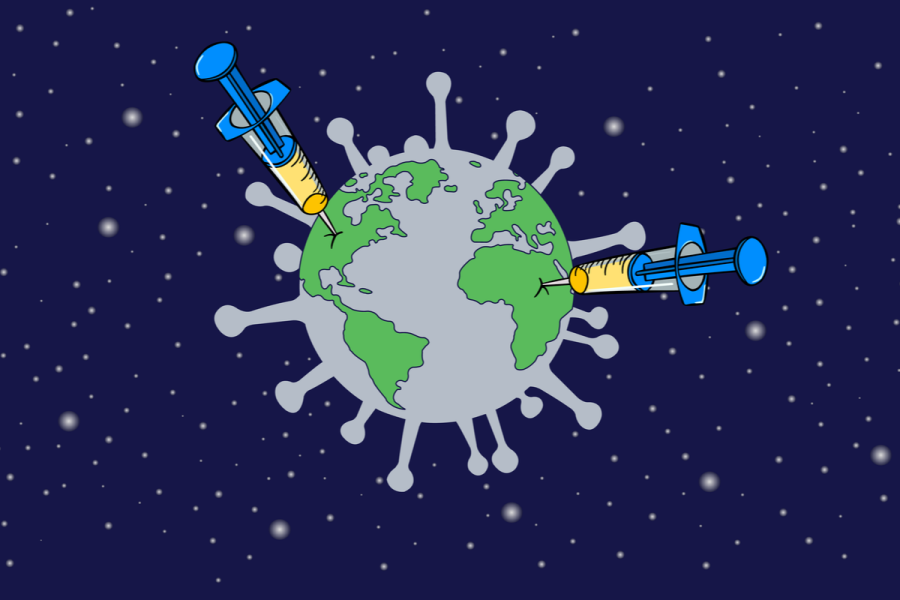Columns
Perspectives on pandemics
Could Covid-19 be nature's response to man’s destruction of the earth's ecology?
Naresh Koirala
'We are not at the top of the food chain; Covid has proved that,' said Steve. He takes care of the security alarm in our house. A tall lean man in his early 50s, he speaks with a slight lisp and carries the demeanour of an easygoing schoolmaster. He is direct and forceful; unafraid of the unconventional. 'This vaccine thing makes no sense,' he continued. 'That does not mean I won't take it. I will. I don't want to die, but...' Our conversation had veered off from Canada's vaccine rollout debacle to humanity's existential concerns the pandemic has evoked. In Steve's words, 'Our diminishing natural immunity against pathogens and increasing vaccine/drug dependency is an existential threat to our species.'
Numerous research reports validate Steve's observations. The Gerontological Society of America reported in 2015: 'Between 1988 and 2010, the median number of prescription medications used among (American) adults aged 65 and older doubled from two to four, and the proportion taking more than or equal to five medications tripled from 12.8 to 39.0 percent.' The United States is just one example. The fact is drug dependency is increasing all over the world.
Even more worrying is the growing frequency of infectious disease outbreaks. According to researchers from Brown University, US, the total number of outbreaks in viruses and casual diseases increased globally by almost 400 percent between 1980 and 2010—from 750 to over 3000. Scientists are predicting more pandemics. The future is likely going to be repeated cycles of pandemics, deaths, economic pain, short-term recovery, and more pandemics, more deaths, more economic and social disruptions. Humanity seems to be in a losing battle with pathogens, viruses in particular.
How did we get here?
I don't think anyone has a definitive answer, but one thing that immediately jumps out is whether the way we interface with nature is a factor. Yuval Harari, a professor of ancient history and the author of the internationally acclaimed book, Sapiens, says human civilisation developed around myths; with time, myths turned into beliefs, and beliefs became unassailable truths. The myth of the omniscient, creator God, religion and associated scriptures has defined our relationship with nature for centuries, and has become the basis of the modern development model.
Consider Christianity and Islam, two religions with a total following of nearly 55 percent of the world population. Christianity commands its followers to multiply, fill the earth, and rule over nature. Quran, the holy book of Islam, assures Muslims that Allah created the world to 'serve men and women, so that human beings can profit from all gifts and bounties which God has given to us in the world, to serve Him'.
Charles Darwin's theory of evolution, that man evolved from a natural process, challenged the creationist argument that mankind was created by God. But it did nothing to dismantle the deeply rooted, God-sanctioned, belief in man’s exclusive authority over earth’s resources. Even the sagacious Institution of Civil Engineers (ICE) of the United Kingdom seemed to endorse the idea. The ICE, the first engineering institution in the world established in 1818, defined civil engineering as 'the art of directing the great sources of power in nature for the use and convenience of man…' in its founding document. (The definition was changed years later and made more respectful to nature.)
The belief in man's supremacy over nature became the basis for our current anthropocentric development model, and the justification for the consequent destruction of the earth's ecology. According to Scientific American (2009), we are degrading upwards of 160,000 acres of rainforests daily and, in a year, making some 50,000 species extinct. When it comes to the abuse of nature, one may think the Hindus would be different. After all, they worship the divine in nature including rivers, mountains, trees, animals and the earth. Yet, they have adopted the same development model as other religionists and development doyens; they treat nature with no less crudity than Christians and Islamists. India and Nepal have some of the most polluted water and air in the world.
Could it be that, like climate change, Covid-19 is nature's response to man’s destruction of the earth's ecology? There is no scientific evidence to support this view, but there should be no argument that over the years we have destroyed the habitat of billions of viruses that live on earth, and to wonder if nature is striking back is not unreasonable.
The way forward
We had pandemics and millions of deaths before Covid-19. They were perhaps nature’s way of warning us against abuse; a call to collaborate or otherwise. Our hubris left no room to listen and reflect. Now we have Covid-19. To date, medical science has advanced largely by the reactive response to new diseases. We get sick and develop remedies. The vaccines against smallpox, flu, chickenpox, measles and many others were developed after the diseases were identified. The availability of vaccines saves millions of lives, but hundreds of thousands of lives are lost before the vaccines are developed. We have seen this happen over and over again. Covid-19 is just the latest in this cycle. The only way to prevent the loss before the vaccines become available is to understand the conditions that facilitate the evolution of new viruses and pre-empt their outbreaks.
Albert Einstein said, 'We can't solve problems by using the same kind of thinking we used when we created them.' The solution to the problem of increasing frequency of outbreaks of infectious diseases must start with some fresh thinking. This includes assuming responsibility for creating conditions for new outbreaks of lethal infectious diseases, and recognising that we share the earth with nature’s other habitats.
Alongside the efforts to develop vaccines for viruses already known, our vaccine research should expand to include an integrated effort of doctors, economists and environmentalists so that we can understand whether our development activities are impacting nature's other habitats and creating conditions for new viruses to evolve. We need to urgently re-examine our development model, and revise it to make it compatible with others with whom we share the earth. Mankind has no monopoly on the earth’s resources.




 16.12°C Kathmandu
16.12°C Kathmandu















